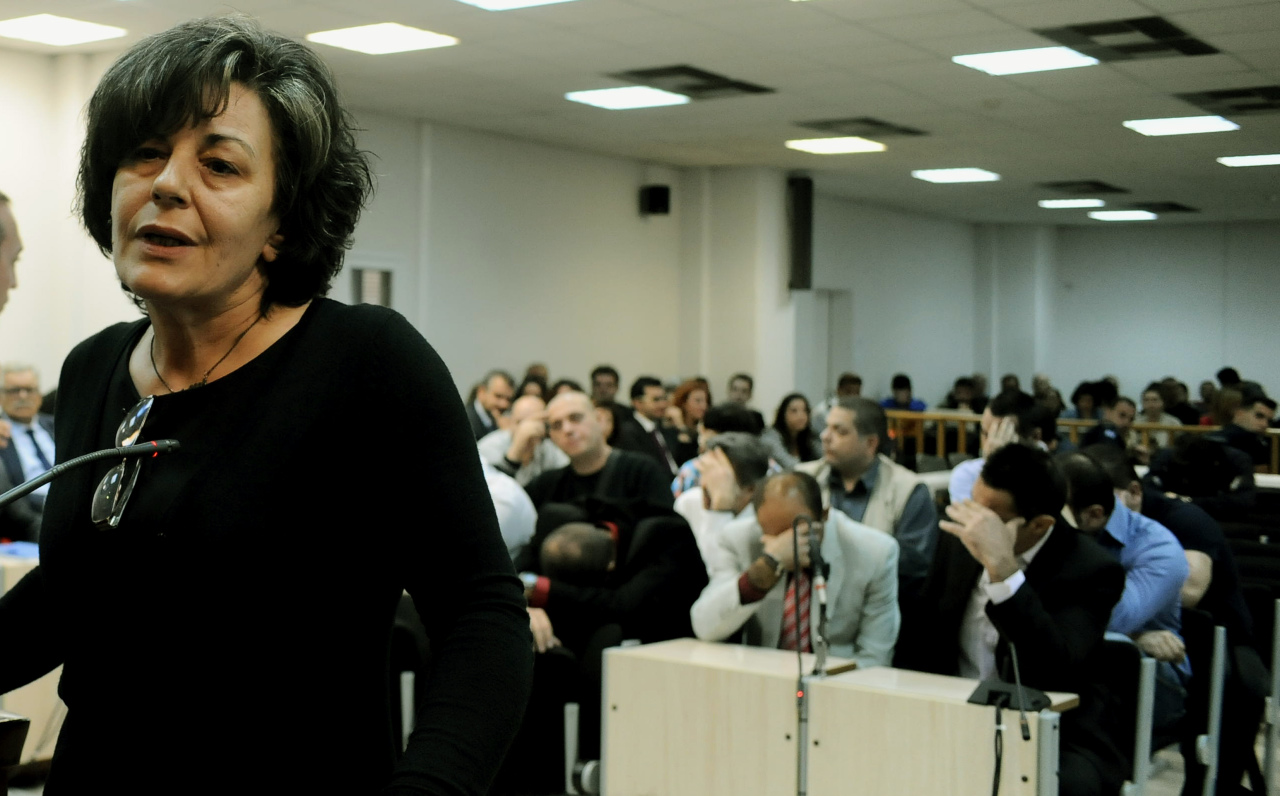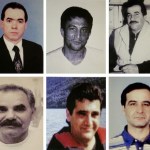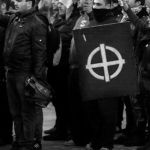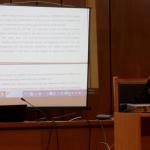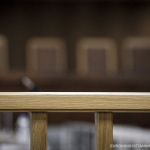18th Hearing, Women’s Section, Korydallos Prison, Athens, 2 October 2015
1. Court access
The hearing reconfirmed that the police’s new policy is to grant access to any interested citizen provided they display their identity cards. The courtroom was packed. Regarding the prospect of a change of venue, the matter was sidelined once again.
2. Presence and representation of the defendants
Twelve defendants were present at the beginning of the hearing. The defendants Konstantinos Korkovilis and Athanasios Tsorvas appeared at 11.04am, two hours into the hearing. Nine defendants were absent. The remaining defendants were, for the most part, represented by their counsel; counsels who were absent at the beginning of the hearing were substituted by their colleagues.
3. Statements from the defence
The hearing began with a statement by Dimtra Velentza, counsel for Thomas Barekas, Aristotelis Chrysafitis, Elpidoforos Kalaritis, Ioannis Kazantzoglou, Nikos Kouzilos and Theodoros Stefas. She referred to the publicity and media coverage the trial had received. She complained that witness testimonies have been leaked to the press, the result of which is that subsequent witnesses are aware of the content of previous witness testimonies. She proceeded to ask the presiding judge to ensure that all those present in the courtroom display their identity cards and demanded that there be no live coverage of the trial. Moreover, she asked that the court not allow photographs to be taken of the defendants or their counsels. Specifically, she said “the defendants do not want photographs and nor do we”. The presiding judge responded that “the court has decided to allow some photographs, provided they do not interfere with the proceedings”. The atmosphere inside the courtroom was already tense, given that immediately before the discussion, defence counsels Vasilis Oplantzakis and Panagiotis Michalolias had implied that the cameras in the courtroom were secretly videotaping the trial rather than simply photographing it. The presiding judge rebutted them: “If you are certain of the existence of a video of the proceedings, you can submit a complaint,” she said
4. Magda Fyssa’s testimony
Magda Fyssa, the mother of Pavlos Fyssas, was the second witness called to give evidence. Given that the court has barred sound recordings, we have attempted to reproduce Ms Fyssa’s testimony with the greatest possible accuracy.
Magda Fyssa: So, I will begin from 17 September, at 5.30pm. I saw him; we said hello. He was on his way to his friend Giorgos’ for coffee with his girlfriend [Chrysa]; from there they would go somewhere to watch the match together. It was one of the few times he had arranged to watch a match without his father.
Presiding judge: Did he live with you?
Fyssa: Yes, but that night I was going to stay at my daughter’s place and I was going to see him the following morning. I never saw him again. At around 2am the buzzer rang.
Presiding judge: Was it a phone or a buzzer?
Fyssa: A phone. My husband called my daughter from her brother-in-law’s phone. He told her to open the door. I understood then that something terrible had happened. He looked shaken. He said, “everything is ok. Pavlos had an accident; he’s at the hospital and asking for you.” I knew somethign terrible had happened, but I didn’t think he was dead. I asked him, “Is that all? Is that all our life was?”
He didn’t reply. It began to dawn on me. I got into the car and my daughter’s brother-in-law drove me. It must be serious, I thought. We got to the hospital. I saw people outside: friends, family. I ran inside and found two doctors. One of then was crying. She was crying but wouldn’t tell me why. I started pulling the curtains aside to see what had happened. The other doctory gave me a pill and told me the truth. “Pavlos is gone.” I said, “how is that possible?” He told me Pavlos had been stabbed in the heart by Golden Dawn. And he said, “Be patient; They’ve caught the guy.” And that the stab wounds had been professionally delivered and that the doctors could not have saved him even had he been stabbed right outside the hospital.
At 5.30pm that day I was speaking with my child and at 3am he was lying, stabbed, in the morgue. But my child was not afraid – those of you who think you scared him, I’m telling you, he was not afraid. He just went to sleep. He was an angel. I tried to warm him up.
The next day, we left the hospital and I tried to find out what had happened from Chrysa [Pavlos’ girlfriend]. Two difficult days and then we found out what had happened. We spent two days collecting information, trying to piece it all together.
Presiding judge: Your son’s age? Physique? Profession?
Fyssa: Thirty-four, 1.75 meters; he was well-built. He worked odd jobs, as a mechanic, an electrician, a concert organiser. But his main interest was music. He wasn’t involved in party politics. He didn’t belong to a party. He spent years working on his music – sometimes professionally. He wrote music and lyrics. His music was antiracist and antifascist.
Presiding judge: Did his music ever bring him into conflict with people? Did he ever tell you that something had happened at a concert?
Fyssa: No. He wasn’t that kind of boy. He never mentioned anything in particular. No. He never told me about anything like that. Besides, even if something had happened, he would have dealt with it with words, alone.
Presiding judge: Are you employed?
Fyssa: I was a seamstress. Now I’m unemployed.
Presiding judge: What did Chrysa say to you? Were they in a relationship?
Fyssa: Yes; they had been together for two years and they lived together for long stretches of time. They were looking for somewhere to watch the match and, given their usual hangout was packed, they decided to keep a table at Koralli for later. They booked a table there, went for a walk and came back a little later for the game. Nine friends ended up meeting there: first, the three of them (Pavlos, Giorgos and Chrysa) and another six arrived at half-time: Melachrinopoulos, Xypolitos, Mantas, Lina, Christos, Pakiotis and others. They had never been there before. Chrysa told me that no one started a fight inside Koralli. But when they walked out of the place, they saw 20 people, wearing black shirts, combat trousers and boots, gathered at the intersection of Pavlou Mela and Kefallinias streets.
Presiding judge: Were they holding anything?
Fyssa: They were holding batons, crowbars and other things. Also, I should mention that at the same time, two police bikes were stationed at the next intersection, of Kefallinias and Tsaldari streets. Four policemen were standing right there. The kids saw Golden Dawn on one side and the police on the other. And a guy in the middle – I’ll call him “the middleman” –went up to the kids and said, “don’t be afraid, I’ll sort this out”. Pavlos said, “Why would I be afraid? I’m in my neighbourhood; I’m free.” The middleman said, “I’m a friend, a special guard, I want to help.” And he went back and forth between the police and the Golden Dawners. The kids started to walk away. One of them hailed a taxi and left right away. They crossed to the other side of Tsaldari street. A hit squad from Nikea arrived to join the original group of 20. A car stopped in front of the kids and asked, “do you guys know where Kefallinias street is?” Later we found out that the driver was the killer. Pavlos said, “this is the street, my friend”. And he turned there. Then the whole gang, together with the hit squad, around 50 people in total, began to approach them.
Presiding judge: How do you know about the hit squads?
Fyssa: We found out about it from the case file. And that Patelis is the “cell leader” of Nikea.
Presiding judge: Alright. Continue.
Fyssa: When they crossed the road and the mob was approaching, Pavlos said: “Guys, run.” The incident took place around building number 60 on the street. But Pavlos did not run and groups of 2–3 men trapped him so he couldn’t escape until the murderer arrived to stab him. The killer was on Xanthou street. He approached on the wrong side of the road. Further down the road, they had beaten up two other boys, Kontonikolas and Melachriopoulos. They threw Kontonikolas to the ground and he lay there, terrified. They did the same to Melachrinopoulos. They threw him down. Pavlos was alone, standing up and fighting. When the car was driving down Xanthou, four people were in it, but when the killer stabbed him, he was alone. He stopped before reaching Pavlos, the other people got out and he continued on his own.
Presiding judge: How far away?
Fyssa: A block. How far was it? 50–100 meters. The others got off on Xanthou street. There is a video of it. I haven’t seen it; I couldn’t bear to. They told me that he got out of the car, saw his target, got back into the car on the wrong side of the road on Tsaldari street, got out and stabbed him twice in the heart.
Presiding judge: Where was Chrysa?
Fyssa: Chrysa didn’t leave. She went to the police at the corner and tried to drag them there. She begged them, “Please, my friends haven’t done anything wrong.” The answer was, “We can’t interfere, nothing is going to happen, they’ll just rough them up a bit.” When she finally managed to convince two police officers, it was already too late.
Presiding judge: Did Pavlos and Roupakias fight? Do you know? Did they swear at each other?
Fyssa: No, nothing. They had all trapped him until Roupakias arrived. I won’t say his name again because he is a murderer. He put his arms around Pavlos and stabbed him.
Presiding judge: What did the other 50 do then?
Fyssa: Before it happened, they cursed and encouraged the animal to stab Pavlos.
Presiding judge: Could they have stopped him?
Fyssa: The police had an obligation to intervene. Why would the rest have stopped him? They are Golden Dawners. What can I say?
Presiding judge: Which of the defendants were there?
Fyssa: Aggos, Michalaros and Tsalikis were in Koralli. Later, Michalaros and Tsalikis joined the hit squad. Later I found out from the case file that one of the other three was Kazantzoglou.
Presiding judge: Where did they stab him?
Fyssa: In the heart.
Presiding judge: Who told you?
Fyssa: The doctor. Please don’t make me say these things. The wounds were fatal, delivered by a trained killer. The doctor told us how it happened. The coroner’s report confirmed it. He died on the spot after four minutes – four minutes that are of crucial importance for those of us he left behind.
Presiding judge: Why crucial?
Fyssa: Because he singled out his murderer. The murderer took his time to leave the scene, even as more policemen arrived and did nothing. Pavlos lifted his shirt and said “Where are you going, man? You stabbed me and now you’re leaving?”
More policemen and patrol cars had arrived. Roupakias was already back in his car. He threw the knife on the ground when they arrested him.
The policewoman shouted, “Now you’ve taken it too far. Knives and stabbings are too much.”
Presiding judge: When?
Fyssa: Once it had already happened. Chrysa told me so.
Presiding judge: What do you think it meant?
Fyssa: That Golden Dawn works closely with the police.
Presiding judge: Did your son know Roupakias?
Fyssa: No.
Presiding judge: Why would Roupakias have wanted to hurt him?
Fyssa: Because he was ordered to do so by the organisation and because he is a trained murderer. Aggos telephoned Kazantzoglou from inside Koralli. They were members of the Nikea local branch. They informed Pateli, the “cell leader” in Nikea; he called Lagos straight away and then sent a group text message to the other members and told them to gather at the offices of the local branch.
Presiding judge: What is Roupakias’s relationship with Golden Dawn?
Fyssa: The murderer was the treasurer of the Nikea branch.
Presiding judge: What about Patelis?
Fyssa: He is one of the five members of the murderers, one of the five members of the organisation [GDW comment: she is referring to the five-member committee that runs each local branch].
Presiding judge: And Lagos?
Fyssa: Lagos supervises. They can’t do anything without Lagos’ approval.
Presiding judge: Were all the people there members of the organisation?
Fyssa: Of course, they can’t do anything without orders. That much is clear.
Presiding judge: Why? What was their motive?
Fyssa: They crave power; anyone who stands up to them needs to be disposed of: Anyone who is different to them has to live under the threat of their violence. That’s how they are: anything that dares to move is slaughtered. I have seen a video of Patelis talking to members, where he says “everything that moves gets slaughtered”. Didn’t the same thing happen to Luqman? The same. They are trained murderers.
Presiding judge: Yes, but what was their motive.
Fyssa: Nothing. They’re just trained murderers. They are a criminal organisation. That night they were looking to make a kill and they did. They don’t leave their posts without orders to do so.
Presiding judge: How were the 25 of them told to go there?
Fyssa: By text message, as I said.
Presiding judge: And was Roupakias ordered to commit the murder?
Fyssa: Yes, at the meeting at the local branch offices.
Presiding judge: What was the content of the text message?
Fyssa: “Everyone to the local branch, now.” From there, the hit squad moved towards Tsaldari street.
Presiding judge: Do you know of other crimes that have been committed?
Fyssa: Luqman. I know Foivos from Faliro who was badly beaten up by Golden Dawn. And the assault on the PAME trade unionists could have resulted in fatalities – it was a fierce beating. And then Mesolongi, Meligalas and, of course, Kasidiaris slapping Kanelli – we all saw that on TV.
Presiding judge: Which of the defendants are responsible for the direction of the organisation? [She read out names of defendants.] Do you know anything about that? What did each person do? Is there a hierarchy? What is the chain of command?
Fyssa: Each of them was responsible for a section. There is a hierarchy, there are members, the five members [who run branches], cell leaders. I know that Lagos gives orders.
Prosecutor: Do you know what they told them at the local branch?
Fyssa: To kill.
Prosecutor: Do you know that based on the outcome?
Fyssa: Yes.
Prosecutor: Was your son a specific target? Had he received any threats?
Fyssa: I don’t know if he received threats; I don’t think so. He was known for his songs.
Prosecutor: Was there a verbal assault at Koralli?
Fyssa: Chrysa said there wasn’t. I forgot to mention that we had no idea the bar was a Golden Dawn hangout.
Shouts from the public gallery: “He was a singer; what are you saying now?”
Fyssa: Aggos, Michalaros and Tsalikis were already inside. We’re talking about hate. These people are driven by hate. Our kids looked like they were different from them. From the structure of the organisation and the way they train their members, it seems evident that it is enough for them that our kids are different. You could tell from the way they looked that they were against Golden Dawn. I imagine the others must have said, “How dare you come here?” When the kids were running, they shouted “Chickens, when we catch you we’ll fuck you up.” But the kids didn’t know that it was a Golden Dawn den.
Presiding judge: Who directed them to the local branch?
Fyssa: Patelis, who got the order from Lagos. At 12.37am, Lagos made a phone call to Michaloliakos, so Michaloliakos must have been informed.
Deputy prosecutor: How many people were in the group of your son’s friends at Koralli?
Fyssa: Three at the beginning, then another six arrived at half-time.
Deputy prosecutor: Had the other six been watching the game elsewhere?
Fyssa: I don’t know.
Andreas Tzelis (counsel for the Fyssas family): Earlier you spoke of a video. What video is this?
Fyssa: I saw the “cell leader” inside the local branch offices giving orders on what the members had to do during an assault in Panagitsa [a square in Nikea, Pireaus]. He said, “I just have to get the boss’ ‘ok’ on this, otherwise we’re not doing anything.”
5. The videos, the photographs and their use in the trial
Here, Tzelis asked to show the witness a video for her to comment on it. Velentza, for the defence, protested about photographs being taken by photographers.
Tzelis continued, saying that the video is part of the case file, taken from Giorgos Patelis’ hard drive. He asked for permission to show it to the witness.
The prosecutor intervened, saying that the video is part of evidence that will be screened in due course. The defence counsel protested that many of them cannot see the video and that Patelis’ lawyer is absent.
A few people began to shout; the presiding judge called a fifteen-minute break. After the recess, the presiding judge repeated that the video and all other evidence would be dealt with when the time comes. Following a motion put forth by the prosecutor, she agreed to allow the counsel to show the witness only still frames from the video, without sound.
Takis Zotos, counsel for the Egyptian fishermen, interjected saying that “it is public evidence and we need everyone involved in the trial to see it; a projector is absolutely necessary. We need to be able to see what the witness does or does not recognise. This is an appropriate moment for the court to decide on the pending request for audiovisual equipment, a projection screen and a computer. We want everyone to see Xanthou street, to visualise the scene of the murder as described by the witness. Besides, the case file itself contains audio files. Witnesses will be examined before seeing the documents. They include recordings of police officers. The witnesses need to be in a position to tell us if they recognise the voices in these audio files.”
Angelos Vrettos, counsel for to the PAME trade unionists, added that “the witnesses won’t be here when the evidence is displayed”.
Thanasis Kampagiannis, counsel for Abouzid Embarak, one of the Egyptian fishermen, said: “The trial should be conducted on equal terms. Our request is to be able to refer to the evidence. It is impossible to conduct a fair trial if the civil counsel does not have the opportunity to refer to the material included in the case file. Our request is grounded in case law. Witnesses show the greatest clarity when they are faced with the essence of the case. The presiding judge asked the witness what the motive for the murder was after she had testified to all that she knew. At this stage, where she is being asked to respond on the basis of her own judgment, the video has to be screened so that the witness can take it into account.”
Kostas Papadakis, also for the Egyptian fishermen, referred to the code of criminal procedure. “Witnesses not only relate facts, they interpret them; they judge them; they have moments of great insight. The witness may even recognise someone inside the courtroom. We all need to see what they recognise. There is a pending request before the court and that decision needs to be taken now. If the court intends to reject our request for audiovisual equipment, let it do so now; otherwise it is merely tacitly implying a rejection of our request.”
At this point, Nikos Roussopoulos, counsel for Ioannis Lagos, protested strongly that it is not up to witnesses to judge the evidence.
After a short break, the presiding judge returned and announced that Magda Fyssa would not conclude her testimony that day. She decided to respond to the civil counsel request at the following hearing. She asked counsels to address the witness with questions that do not require documents from the case file and that the hearing continue with their remaining questions. The courtroom was in uproar. Tzelis suggested that the court be adjourned until a decision is made on the matter. Eleni Zafiriou, for the PAME trade unionists, told the presiding judge that she believed the witness was being put under psychological strain. Tzelis insisted that he wanted to ask something regarding a particular fragment found on Patelis’ hard disk and which came to the investigating magistrates’ attention in defendant Nikos Tsorvas’ testimony. He showed the witness pictures that could not be seen by anyone else in the court.
After a short break resulting from the commotion in the courtroom, the presiding judge adjourned the court to 6 October, at which point Fyssa will continue her testimony.

